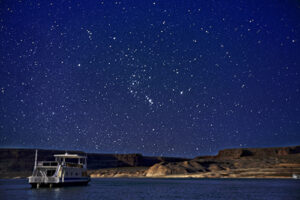Stargazing at Lake Powell
If you’re an astronomy enthusiast or have a love for astrophotography, visiting Lake Powell in late July to mid-August will be a great time to catch a glimpse of the night sky. Sitting away from major light pollution from busy cities, Lake Powell is the perfect spot to catch some of the best meteor showers for the year. Find out more about these meteor showers and plan your visit to see these spectacular views of the night sky.

Delta Aquarid Meteor Shower
A couple of hours before dawn in late July to early August, the Delta Aquarids will be showering the sky near the constellation of Aquarius. Viewing this meteor shower before dawn will be best for viewing as the moon will set around this point in the early morning. We do recommend planning your visit for the night when the new moon will be forming, but if you don’t have a chance to do so, you’ll want to plan for an early morning viewing of the meteors instead. The Delta Aquarids will fall anywhere from 15-20 times per hour and will stick around for a good while, providing many opportunities to see this amazing event for yourself.
Perseids Meteor Shower
The most anticipated meteor shower in the year in the Northern Hemisphere is the Perseids Meteor Shower. The anticipated peak date for this meteor shower will be August 12 but will likely run from August 10-13. Similar to the Delta Aquarids, the best time to view the Perseids will be before dawn due to the presence of the moon in the sky. The Perseids however, will produces about 50 to 100 meteors per hour in a dark sky at its peak time. Likely to radiate from the constellation Perseus the Hero, the meteors will be view-able throughout the entire night sky and, along with the continuing Delta Aquarid Meteor shower, will bring about a beautiful result of two coinciding meteor showers.
Plan your trip to Lake Powell in August now to catch a glimpse of these beautiful meteor showers for yourself. If you would like to learn more about various meteor showers and celestial events that you can see at Lake Powell, visit EarthSky.com.


